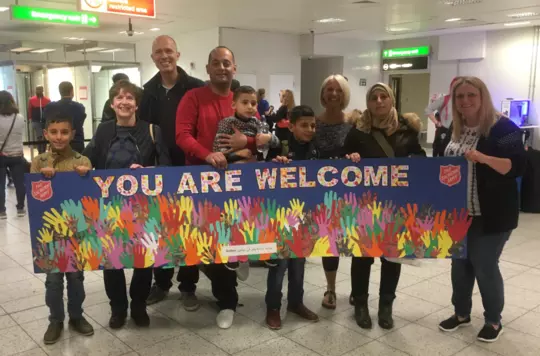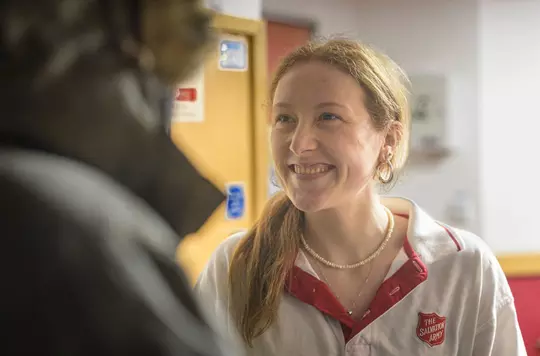22 June 2024
Refugee response: A territorial network of support
George Tanton

George Tanton finds out how corps are working together to support refugees and asylum seekers across the territory.
‘In Iraq, it is dangerous to be a Christian,’ proclaims Daniel, an Iraqi Christian convert who came to the UK seeking asylum. ‘I escaped to find peace and lead a new life. I left everything to follow Jesus.’
Daniel found The Salvation Army via Welcome Churches, an association of churches committed to supporting refugees and asylum seekers. He made contact with Stepney corps officer Lieutenant Victoria Moye. The corps supports other refugees, including Kurdish Iranians, Syrians and Ukrainians.
‘We got to know him and he confided his story in us,’ says Ben Still, the territory’s refugee response manager and a soldier at the corps. ‘A committed Christian, Daniel quickly became part of the church family, taking part in worship and joining in with our garden project.’
However, one day Daniel received a letter from the Home Office informing him that he was to be rehoused in Southampton.
‘One of the first things he did was message us with a copy of the letter,’ Ben recalls. ‘He had a week’s notice. On the day of the move, he was told by the driver he was actually going to Reading!’
Thankfully, the Army ensured that Daniel would find a friendly face to greet him in his new home.
Community Development Manager Simon Moore (Reading Central) says: ‘An officer in Southampton told me: “Heads up, mate! Daniel is coming your way.” I then heard from Victoria and Ben giving me a bit more information.’
Daniel is now thriving at Reading Central, thanks to support from the corps community.
‘All the people here have really made him feel welcome,’ Simon expresses.
The war in Ukraine has led to the biggest refugee movement in Europe since the Second World War. Coupled with ongoing conflicts in Africa and the Middle East, Salvationists within the UK and Ireland Territory are supporting a number of people in the asylum processing system.
‘The decisions made on asylum claims historically take a long time,’ states Ben, ‘so there’s a lot of people in the system.’
The length of the processing system means that refugees can potentially be moved up to four times, as in Daniel’s case.
Ben says moving can lead to further emotional turmoil: ‘These people are already potentially quite traumatised from their experiences. Not being able to build up local support networks, or not feeling safe and stable, can add to the problem.’
However, in towns and cities across the UK there are Salvationists willing to help refugees in their darkest hours. The territorial reach of the Army, with its informal networks of local knowledge, helps ensure that refugees are supported wherever they are. To help co-ordinate this support, Ben hosts a monthly online refugee response forum.
‘It’s open to anyone working with refugees and asylum seekers – they could be corps officers, local leaders or volunteers,’ he explains. ‘It’s an opportunity to share information and resources.’
‘It’s really helpful,’ expresses Victoria. ‘It’s a great space to communicate. Officers and employees in that network will respond at the drop of a hat when needed. With Daniel’s situation, things changed so fast. However, we were able to work as a whole team and provide support.’
Major Phil Layton (Upper Norwood) helped a Namibian family, who were being housed in a nearby hotel.
‘They came to us for help with supplying clothing,’ he explains. ‘It is a personal policy that anyone who comes for help materially will also get help spiritually.’
They started coming along to meetings. After they had attended for 18 months, they were relocated to Portsmouth.
‘Once they were told their new address, I got in touch with Portsmouth Citadel to let them know our beloved friends would be arriving in the area,’ Phil adds. ‘Communicating with other corps about the relocation of refugees is the right thing to do. The Army has the privileged position of being able to help them with important practical and emotional needs. Within this we also have the great privilege, responsibility and opportunity to share the gospel. The most important thing we do is put Jesus at the centre of our relationships.’
‘Isaiah 42:3 and 4 is a prophecy of how Jesus will treat the crushed and downhearted,’ comments Captain Sarah Ilsters (Portsmouth Citadel). ‘We too should reflect his character to those around us suffering.’
The family from Upper Norwood have now connected into corps life, she explains: ‘It has not all been plain sailing. It has taken time for the family to adjust to life in Portsmouth, but I hope the pastoral care we have given has helped them settle.’
Captain Richard Wearmouth (Camberwell) found himself in a similar situation when assisting a young refugee family who had been told they were to leave London and be rehoused in Yorkshire. Richard quickly communicated with Captain Diane Pryor (Wombwell with Barnsley), who subsequently made arrangements for the family’s arrival.
‘She was really helpful,’ Richard expresses. ‘She acquired them furniture and household goods from a SATCoL donation centre and ensured that they had food in their cupboards.’
Diane is still in contact with the family to continue supporting them and they are settling into their new home.
Richard credits the Army’s network of local support as paramount in ensuring the family received the help they needed.
Sarah agrees: ‘It is important that we are aware of what is going on and to experience the Army as a “whole body” that communicates and helps those in need, wherever they are situated or relocated to.’
Written by

George Tanton
Editorial Assistant
Discover more

Supporting and resourcing local expressions of The Salvation Army to help people seeking sanctuary.

The Salvation Army's International Positional Statement on Refugees and Asylum Seekers.

Ahead of the general election on 4 July, Captain John Clifton begins a series of reflections about The Salvation Army’s four key principles for political candidates.

'Our Home' is the theme of Refugee Week 2024 (17-23 June). Find resources to mark this significant time, including Refugee Sunday (23 June).